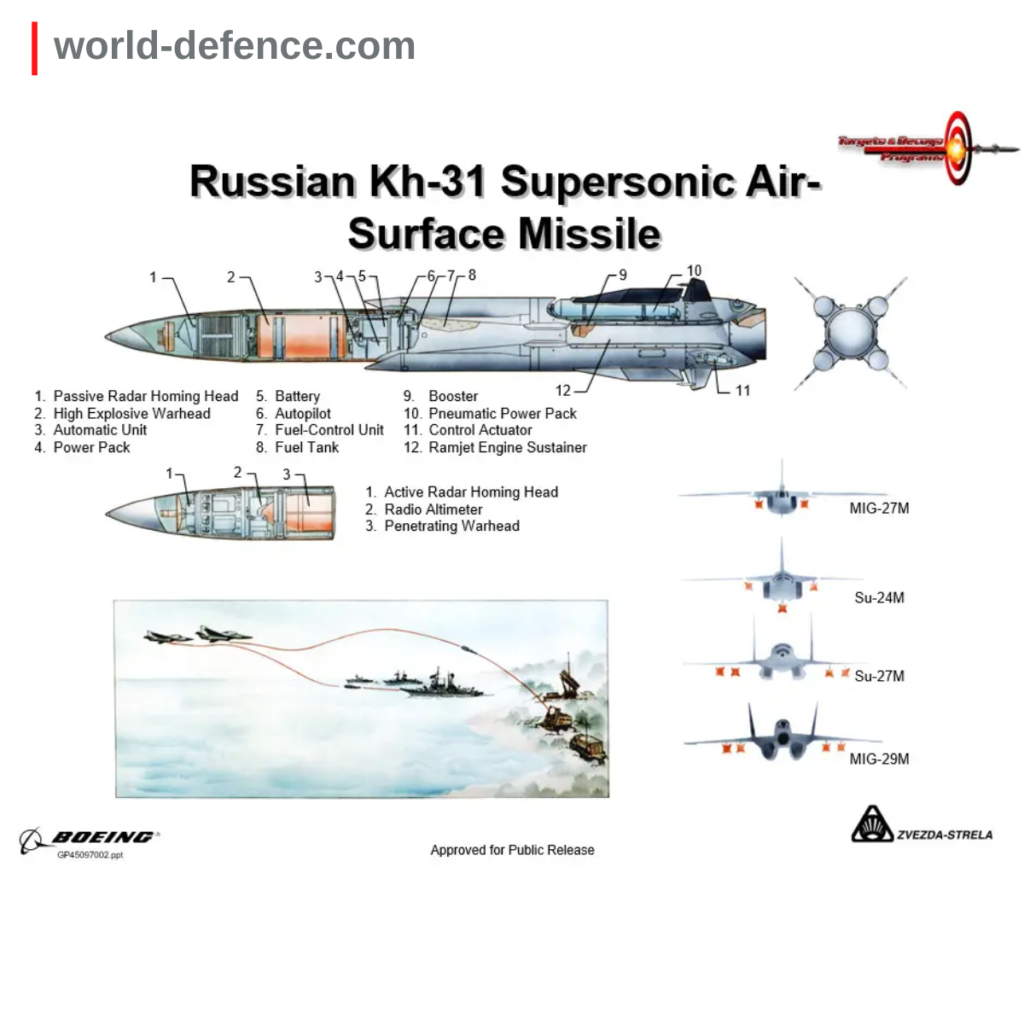The air-launched anti-radiation missile Kh-31 designed and manufactured by Russia’s Tactical Missiles Corporation has demonstrated high effectiveness in Ukraine due to its new multipurpose warhead, reported TASS.
Follow World Defence on Google News
Advertisement
The report, citing a source in the domestic defense ministry, claimed that an air-launched anti-radiation missile was equipped with a “top-notch” multipurpose warhead that could engage any target.
The missile in question has demonstrated its remarkable effects on the battlefield against Ukrainian targets. “The previous missile of this type had three different warheads employed depending on the designated target,” the source told TASS.
According to another source in the domestic defense ministry, who spoke to TASS in October 2022, the air-launched anti-radiation missile manufactured by Tactical Missiles Corporation demonstrated its above 98% efficiency in the special military operation in Ukraine.
The report did not mention the name of the new air-launched anti-radiation missile.
Advertisement
READ MORE
However, the military output catalog of the company indicates that the new weapon could be the air-launched, high-speed anti-radiation Kh-31PD missile meant to attack enemy radar installations and surface-to-air missile systems.
The missile, which can be air-launched from an altitude of 15 kilometers and carries a 110-kilogram warhead, can engage targets at a maximum distance of 250 kilometers. The Kh-31P missile was its forerunner.
The report noted that the entire family of cutting-edge air-launched weapons developed and manufactured by Tactical Missiles Corporation was tested successfully in Ukraine.
The new missile’s principal modifications reportedly include replacing three selective heads with a single broadband that jams the spectrum of applied and projected frequencies used by a possible adversary’s air defense systems.
The Kh-31PD, a longer-range variant of the Kh-31P, can be launched primarily from fighter aircraft like the Su-30MK, Su-34, Su-35, MiG-29K, MiG-29KUB, and MiG-35.
Advertisement
Russia’s Anti-Radiation Missile
In November 2022, RUSI noted that Su-30SM and Su-35S jets frequently fired the Kh-31P and Kh-58 anti-radiation missiles to disable Ukrainian SAM radars.
Commanders of the aviation and air defense units of the Ukrainian Air Force reportedly revealed several times that Kyiv had lost several SA-11 and SA-8 SAMs to the Kh-31P and Kh-58 missiles fired by Russian jets.
Along with the continued extensive use of Kh-31P and Kh-58 ARMs by VKS aircraft, Russian forces also efficiently coordinated operations with hunting complexes of Orlan-10 UAVs to disable the Ukrainian defense system.
The Kh-31, which Russian pilots refer to as “Supersonic Death,” is nearly impervious to enemy anti-aircraft defenses due to its incredible speed and ability to launch a counterattack.
Advertisement
The Kh-31 missile primarily comes in two versions: the Kh-31A and the Kh-31P. The Kh-31A (Active) is an anti-shipping cruise missile (ASCM) type that locates its target area using inertial guidance.
The missile is capable of engaging ships displacing up to 4,500 tons. The Kh-31P is an anti-radiation missile (ARM) variant designed to destroy active (radiating) adversary radars. It is meant to disable air operations control radars, early warning radars, and medium and long-range SAM systems.
Russia has also produced a missile variant with a deadlier (heavier) warhead. The Anti-Shipping Cruise Missile (ASCM) configuration called Kh-31AD was first displayed at MAKS 2019. It was designed to destroy landing ships.
The missile’s modern ARM derivative, Kh-31PD, is also deployed in Ukraine. Compared to the American AGM-88 HARM, the Kh-31 is a substantially larger missile. The D variant’s 110-kilogram warhead weighs much more than the HARM’s 68-kilogram warhead.
The D variant has far more momentum when impacting a target thanks to its 1000 m/s speed, which is significantly higher than the HARM’s 600 m/s speed. As a result, the destruction brought on by the Kh-31 would be far greater than that by HARM.
The American missile’s AGM-88E variant is otherwise more sophisticated than the Kh-31. This variant of the American missile is more challenging to avoid than the Kh-31.
The AGM-88E is not blinded if an enemy disables the SAM radar. It records the location of the enemy radar and utilizes its own high-resolution (millimeter wave) radar to “see” the target radar.
Advertisement

